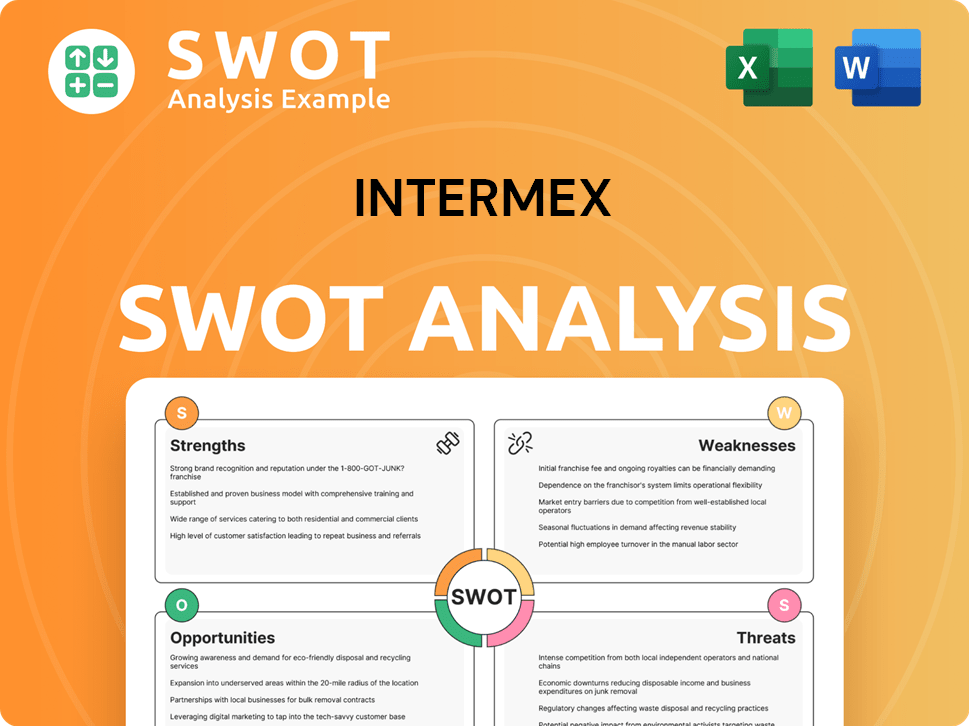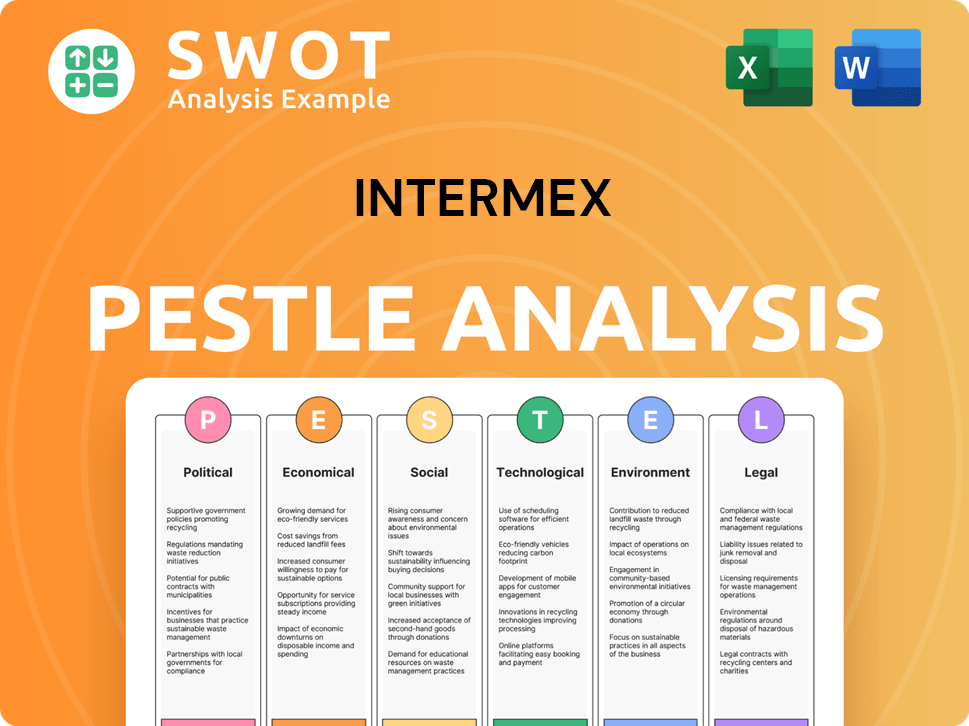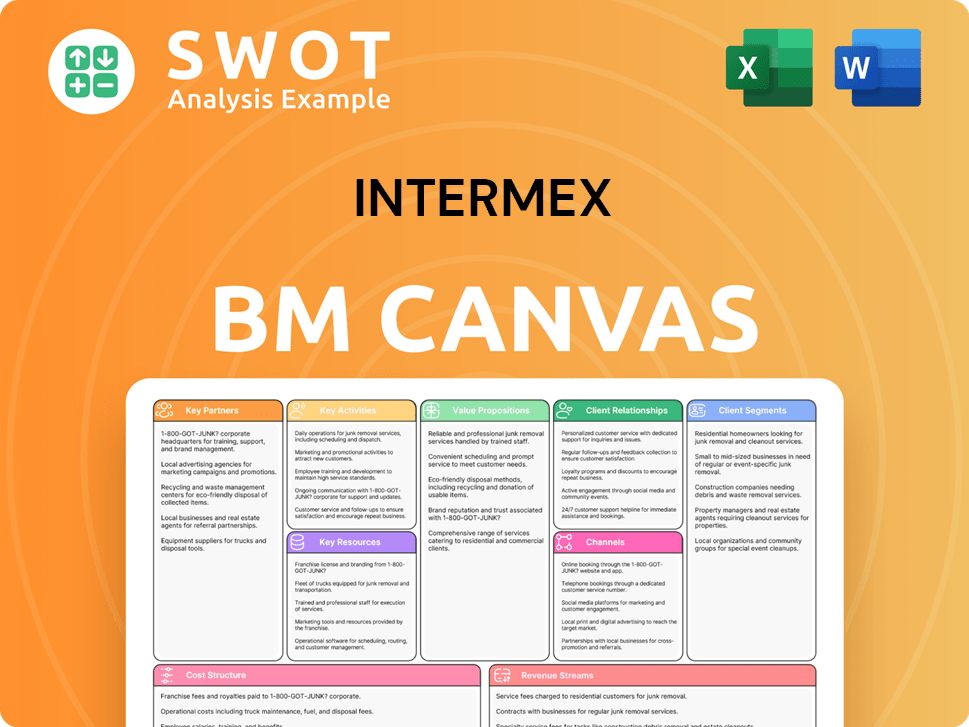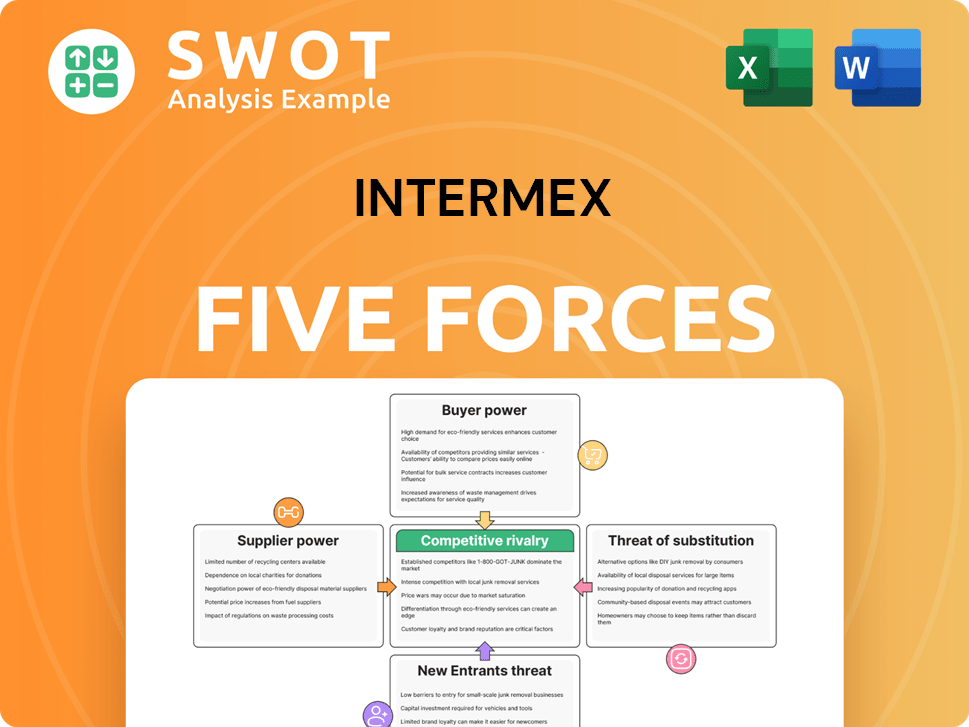Intermex Bundle
Who Really Controls Intermex?
Understanding the ownership structure of Intermex is crucial for any investor or stakeholder looking to navigate the financial landscape. From its humble beginnings to its current status as a publicly traded company, Intermex's ownership has undergone significant transformations. Knowing who holds the reins can reveal a lot about the company's future direction and financial health.

This analysis will provide a comprehensive overview of Intermex SWOT Analysis, exploring the evolution of its ownership, from its founders to the current major Intermex shareholders. We'll examine the impact of its Intermex stock debut and subsequent developments, shedding light on the key players and their influence. This deep dive into Intermex ownership will also touch upon Intermex company profile details, including Intermex financial information, to provide a complete picture of this leading money remittance services provider.
Who Founded Intermex?
The company, initially known as Intermex Wire Transfer, LLC, was established in 1994. The founders' names and specific initial equity details aren't readily available in the provided information. The early focus was on building a strong agent network for remittances from the United States to key Latin American markets, concentrating on areas with large Hispanic populations.
In its early stages, Intermex operated as a private company. The company's strategy centered on cash-based transactions, which were crucial for its target demographic. This approach helped establish a reliable service for sending money internationally, particularly to Latin America.
A significant shift in Intermex ownership occurred in February 2017. Stella Point Capital, a private equity firm based in New York, acquired a majority interest in the company. This acquisition marked a pivotal moment in Intermex's history.
The 2017 acquisition by Stella Point Capital from Lindsay Goldberg was a key event in the evolution of Intermex ownership. The company applied 'push-down' accounting, adjusting assets and liabilities to fair value. Robert (Bob) Lisy, the CEO at the time, continued to lead the company. This partnership aimed to accelerate growth and solidify Intermex's position in the remittance industry.
- The company's early focus was on cash-based remittances.
- Stella Point Capital acquired a majority stake in February 2017.
- Robert (Bob) Lisy remained CEO after the acquisition.
- The goal was to accelerate growth within the remittance sector.
Intermex SWOT Analysis
- Complete SWOT Breakdown
- Fully Customizable
- Editable in Excel & Word
- Professional Formatting
- Investor-Ready Format

How Has Intermex’s Ownership Changed Over Time?
The journey of Intermex's ownership has been marked by significant shifts. Initially, the company was acquired by Stella Point Capital in February 2017. This was followed by a pivotal move in July 2018, when Intermex transitioned to a publicly traded entity. This transition occurred through a merger with FinTech Acquisition Corp. II, a special purpose acquisition company (SPAC). The merger, valued around $260 million, involved cash and stock, with FinTech acquiring Intermex. Following the merger, FinTech was renamed International Money Express, Inc., and its stock continued to be listed on Nasdaq. This was a reverse recapitalization, with FinTech treated as the 'acquired' company for financial reporting.
As a publicly listed company, Intermex's ownership structure now includes a diverse group of shareholders. These include institutional investors, mutual funds, index funds, and individual insiders. Detailed breakdowns of the current major stakeholders can be found in the company's SEC filings and annual reports. You can access these filings as of May 12, 2025. The company's evolution into a publicly traded entity has broadened its ownership base, making it accessible to a wider range of investors and increasing its visibility in the financial markets. If you want to learn more about the Revenue Streams & Business Model of Intermex, check out this article.
| Event | Date | Impact on Ownership |
|---|---|---|
| Acquisition by Stella Point Capital | February 2017 | Private ownership. |
| Merger with FinTech Acquisition Corp. II (SPAC) | July 2018 | Transition to public ownership; listing on Nasdaq. |
| Acquisition of Envios de Valores La Nacional Corp. | November 2022 | Expansion of market presence in the Dominican Republic and Latin America. |
| Acquisition of LAN Holdings, Corp. | April 2023 | Expansion of send capabilities to include Canada, Italy, Spain, and Germany. |
| Acquisition of a small unnamed remittances player | 2024 | Expansion of send capabilities to include the UK. |
Intermex has strategically expanded its global footprint through acquisitions. The acquisition of Envios de Valores La Nacional Corp. in November 2022 strengthened its presence in key Latin American markets. The acquisition of LAN Holdings, Corp., in April 2023, broadened its send capabilities beyond the US to include Canada, Italy, Spain, and Germany. In 2024, Intermex acquired a small unnamed remittances player, adding the UK as a send market. These acquisitions have been instrumental in expanding Intermex's reach to over 60 countries, enhancing its position in the global remittances market.
Understanding Intermex ownership involves recognizing the shift from private to public ownership and the impact of strategic acquisitions.
- Intermex is a publicly traded company listed on Nasdaq.
- Major shareholders include institutional investors and mutual funds.
- Strategic acquisitions have expanded its global presence.
- SEC filings provide detailed ownership information.
Intermex PESTLE Analysis
- Covers All 6 PESTLE Categories
- No Research Needed – Save Hours of Work
- Built by Experts, Trusted by Consultants
- Instant Download, Ready to Use
- 100% Editable, Fully Customizable

Who Sits on Intermex’s Board?
The Board of Directors at International Money Express, Inc. (Intermex) is pivotal in steering the company's strategic direction and ensuring good governance. The leadership team includes Robert (Bob) Lisy as Chairman, Chief Executive Officer, and President. Key executives also include Andras Bende as Chief Financial Officer, Christopher Hunt as Chief Operating Officer, and Frank Pargac as Chief Legal Officer & Secretary. Joseph Aguilar serves as President and General Manager of Latin America. In July 2024, Chris Kawula joined as the new Executive Vice President, Head of Sales, reporting directly to Bob Lisy.
The Board's responsibilities extend to making critical decisions that affect the company's future. For example, in February 2025, the Board decided to suspend a previously announced assessment of strategic alternatives, including a potential sale or merger. This decision, made after a review by the independent Strategic Alternatives Committee (SAC) and considering stockholder views, highlights the Board's role in shaping Intermex's strategic plan and its commitment to maximizing stockholder value. The SAC consisted only of independent Board members and worked with independent financial advisor Lazard Freres and the company's financial advisor, FT Partners.
| Board Member | Title | Key Role |
|---|---|---|
| Robert (Bob) Lisy | Chairman, CEO, President | Oversees overall strategy and operations |
| Andras Bende | Chief Financial Officer | Manages financial planning and reporting |
| Christopher Hunt | Chief Operating Officer | Supervises day-to-day operational activities |
| Frank Pargac | Chief Legal Officer & Secretary | Handles legal matters and corporate governance |
| Joseph Aguilar | President and General Manager of Latin America | Leads operations in the Latin American region |
| Chris Kawula | Executive Vice President, Head of Sales | Leads sales strategies and initiatives |
Understanding Intermex's growth strategy requires a look at its leadership and the decision-making processes that influence the company's performance. While specific details about the voting structure are not available, the Board of Directors plays a crucial role in representing the interests of Intermex shareholders. Information on Intermex ownership, including major investors and insider trading, can be found in the company's financial reports and filings.
The Board of Directors at Intermex is responsible for the company's strategic direction and governance.
- Robert Lisy serves as Chairman, CEO, and President, leading the executive team.
- The Board makes important decisions, as seen in the February 2025 decision regarding strategic alternatives.
- Shareholders' interests are represented through the Board's actions and oversight.
- Further details on Intermex ownership can be found in financial reports.
Intermex Business Model Canvas
- Complete 9-Block Business Model Canvas
- Effortlessly Communicate Your Business Strategy
- Investor-Ready BMC Format
- 100% Editable and Customizable
- Clear and Structured Layout

What Recent Changes Have Shaped Intermex’s Ownership Landscape?
In the past few years, the ownership landscape of Intermex has seen notable shifts. In late 2024, the company explored a potential sale but decided against it, opting instead to concentrate on growing its digital services. This strategic pivot reflects a commitment to long-term value creation, as stated in their February 2025 announcement. The company's decision to focus on its current business model indicates confidence in its existing strategy and future growth prospects. This strategic decision impacts the value of the Intermex stock and the outlook for Intermex shareholders.
Intermex has actively returned value to its shareholders. In Q4 2024, they repurchased 1,025,821 shares for $20.2 million, with $63.2 million remaining for future repurchases. For the full year 2024, the company bought back 3,765,320 shares for $75.1 million. This consistent share repurchase activity demonstrates the company's dedication to enhancing shareholder value and managing its capital effectively. Understanding the Intermex ownership structure is key to understanding these financial moves.
| Metric | 2024 | 2023 |
|---|---|---|
| Revenue (USD millions) | $658.6 | N/A |
| Shares Repurchased | 3,765,320 | N/A |
| Cash and Cash Equivalents (USD millions, as of March 31, 2025) | $152 | N/A |
The company's financial performance in 2024 showed a revenue of $658.6 million. While overall revenue remained relatively flat due to a slowdown in the Latin American remittances market, the digital segment experienced significant growth. The company's focus on digital services is further supported by its guidance for 2025, projecting revenues between $657.5 million and $677.5 million. For more insights into the company's growth strategy, you can read about the Growth Strategy of Intermex.
The ownership of Intermex is primarily held by institutional investors and public shareholders, as the company is publicly traded. Detailed information on major investors can be found in their SEC filings.
Intermex's stock is publicly traded, and its stock ticker symbol can be found on major financial platforms. Investors can access Intermex stock price history and company financial reports through these platforms.
Intermex is a company that facilitates money transfers, with a focus on digital services and expansion into new markets. Its headquarters location and company background provide context for understanding its operations.
Key financial metrics for Intermex include revenue, cash reserves, and debt-to-adjusted EBITDA ratio. Investors can find detailed financial data in the company's annual reports.
Intermex Porter's Five Forces Analysis
- Covers All 5 Competitive Forces in Detail
- Structured for Consultants, Students, and Founders
- 100% Editable in Microsoft Word & Excel
- Instant Digital Download – Use Immediately
- Compatible with Mac & PC – Fully Unlocked

Related Blogs
- What are Mission Vision & Core Values of Intermex Company?
- What is Competitive Landscape of Intermex Company?
- What is Growth Strategy and Future Prospects of Intermex Company?
- How Does Intermex Company Work?
- What is Sales and Marketing Strategy of Intermex Company?
- What is Brief History of Intermex Company?
- What is Customer Demographics and Target Market of Intermex Company?
Disclaimer
All information, articles, and product details provided on this website are for general informational and educational purposes only. We do not claim any ownership over, nor do we intend to infringe upon, any trademarks, copyrights, logos, brand names, or other intellectual property mentioned or depicted on this site. Such intellectual property remains the property of its respective owners, and any references here are made solely for identification or informational purposes, without implying any affiliation, endorsement, or partnership.
We make no representations or warranties, express or implied, regarding the accuracy, completeness, or suitability of any content or products presented. Nothing on this website should be construed as legal, tax, investment, financial, medical, or other professional advice. In addition, no part of this site—including articles or product references—constitutes a solicitation, recommendation, endorsement, advertisement, or offer to buy or sell any securities, franchises, or other financial instruments, particularly in jurisdictions where such activity would be unlawful.
All content is of a general nature and may not address the specific circumstances of any individual or entity. It is not a substitute for professional advice or services. Any actions you take based on the information provided here are strictly at your own risk. You accept full responsibility for any decisions or outcomes arising from your use of this website and agree to release us from any liability in connection with your use of, or reliance upon, the content or products found herein.